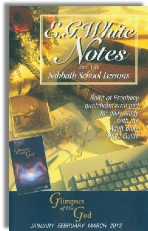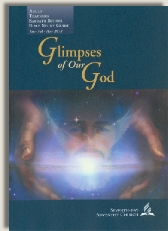|
||||||||||||||
Commentary on "The Triune God"
Day 6: Thursday, January 5, 2012 - The Trinity and Salvation
Overview
Today's lesson is a discussion of the relationship between the nature of God and salvation.
Observations
Today's lesson says: “This passage in the Gospel of John is the most extensive concentration of references to the coequal, three-Person God. Here, the inter-dynamics among the Trinity come through repeatedly.” And the Easy Reading Edition says: “These verses in the Gospel of John are the best examples of the coequal (made of equal parts), Three-Person God. Here the idea of the Three Persons of the Godhead, working together as One, is repeated often.” (Parentheses in original.)
Both the standard and Easy Reading statements are a misusage of language. Merriam-Webster defines “coequal” as “equal with one another.” How can a “God” be “coequal”? With whom is He equal? The statement only makes sense when you realize that Adventism teaches that “God” is not a living Supreme Being but merely the title of a “group”--an organization or “club,” comprising three divine beings (gods). Thus, the Easy Reading Edition has to define “coequal” as “made of equal parts,” which actually refers to their “God.” But again, this is not the doctrine of the Trinity, which teaches that God is “without parts” and is not made up of separate components joined together. Notice also that the Easy Reading version refers to “the Three Persons of the Godhead” as merely “working together as One.”
Today's lesson goes on to say: “If Christ were not fully God, then all we have is the Lord shifting the punishment for our sins from one party to another, as opposed to taking them upon Himself.”
However, as we saw earlier this week, the Adventist definition of “fully God” simply means that Christ is one of three “equally divine” Beings. Thus, in the Adventist worldview, if the Father punished Christ for our sins, it would indeed be “the Lord shifting the punishment for our sins from one party to another.” In order for God to truly take His own punishment for our sins on the cross, Jesus Christ must be the only true God—the one undivided and indivisible divine Being, as Colossians 2:9 teaches. In John chapter 14, Jesus says: “He who has seen Me has seen the Father; how can you say, ‘Show us the Father’? Do you not believe that I am in the Father, and the Father is in Me?” (John 14:9b-10a NASB) And 2 Corinthians 5:21 (NASB) says that “...God was in Christ reconciling the world to Himself...”
The author also says: “Were Jesus not divine, then God’s law would not be as sacred as God Himself, because the violation of it would be something for which a created being could atone.”
Here we see the Adventist idea that the Law (which, in Adventism, refers especially to the Sabbath) is “as sacred as God Himself,” which raises the Law (a creation of God) to the level of Godhood. This is yet additional idolatry, on top of their idolatrous “Godhead.”
Then toward the end of the lesson, the author writes: “Also, our assurance of salvation through what Christ has done for us—and not through our own works—comes from the fact that God Himself paid the penalty for our sins.”
This sentence is completely disingenuous. Not only does Adventism's authoritative prophetess, Ellen G. White, forbid her adherents from having assurance of salvation, but she also teaches that salvation does indeed come through our own works. And not only does Adventism deny the fact that Jesus Christ is actually “God Himself” and that Jesus paid the penalty in full for our sins, completely atoning for them and blotting them out, but they actually teach that our sins are not actually atoned for/taken away/blotted out until Satan bears them and pays the penalty for them as the “scapegoat” of Leviticus 16. In other words, nothing in the author's sentence accurately reflects the actual teachings of Adventism.
Also, the question at the end of the lesson starts out with: “Think for a moment: the Creator of the universe died in your stead, in your place, so you could have the promise of eternal life in Him.”
Notice that they only believe you can have “the promise of eternal life,” not that you can actually “know that you have eternal life” (1 John 5:13).
Summary
- God is not a group “made of equal parts,” but instead He is, as the Christian confessions state, a single living Being “without body or parts.”
- In order for God to truly take His own punishment for our sins on the cross, Jesus Christ must be the only true God—the one undivided divine Being—as the Bible teaches.
- If you have trusted in the true Jesus Christ alone for your salvation, “you may know that you have eternal life.” (1 John 5:13 NASB)
Copyright 2011 BibleStudiesForAdventists.com. All rights reserved. Revised December 29, 2011. This website is published by Life Assurance Ministries, Glendale, Arizona, USA, the publisher of Proclamation! Magazine. Contact email: BibleStudiesForAdventists@gmail.com.
The Sabbath School Bible Study Guide and the corresponding E.G. White Notes are published by Pacific Press Publishing Association, which is owned and operated by the Seventh-day Adventist church. The current quarter's editions are pictured above.
Official Adventist Resources
Standard Edition Study Guide Week 1
Teacher's Edition Study Guide Week 1
Easy Reading Edition Study Guide Wk 1
Search the Complete Published Ellen G. White Writings
Please Support This Project


